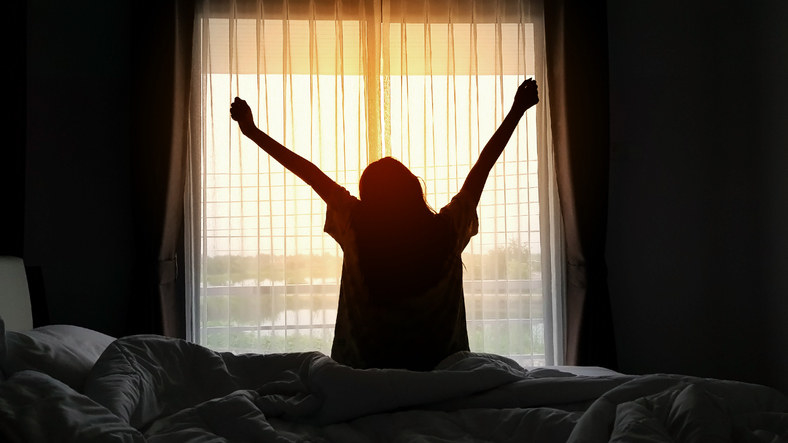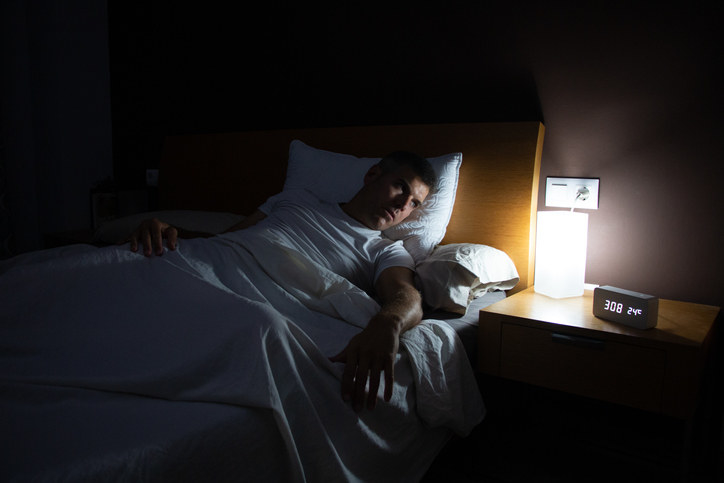Hello, my favorite internet friends. Today we are here to see if there is any truth behind a couple of sleep-related TikToks. First, we'll discuss a mega-viral TikTok from user @sedonerrr, who claims that sleeping on your side causes your face to be asymmetrical:
And then we'll talk about this mega-viral TikTok from user @notyourquirkyblackfriend. She explains how humans are supposed to be segmented sleepers (meaning we should sleep when we felt like it), but industrialization forced us to sleep eight hours at once each night:
In her TikTok, she says, "The sleep economy is a $70 billion dollar industry, which profits off the fact that we can't sleep because we just can't seem to get the eight hours they recommend for us when — plot twist — we're not actually supposed to sleep eight hours. You see, kids, humans were supposed to be segmented sleepers, which means we slept in parts. We slept, woke up, then went to sleep again when we felt like it. But that didn't really fit in with industrialization, did it? Thanks to artificial light and Henry Ford...we now force ourselves to sleep eight hours, then wake up to go to our nine-to-fives, which — who am I kidding — are actually eight-to-sixes. ... The sleep economy knows that if you have trouble, you'll just spend $5,000 on a mattress or hundreds in sleeping pills so you can get those precious eight hours."
To find out the truth, BuzzFeed spoke to Dr. Carleara Weiss, who is a geriatric nurse specialist with a Ph.D. and postdoctoral focus on behavioral sleep medicine and circadian rhythms.
So, let's tackle the face symmetry TikTok. Can sleeping on your side or stomach actually change the symmetry of your face? No! "Sleep may affect wrinkle formation on your skin rather than facial symmetry. Facial symmetry is determined by bone structure, like the maxilla or mandible. Sleeping on your side or stomach will not affect your face symmetry because that is shaped during gestational development," explained Dr. Weiss.
In short, the way you sleep won't change your facial structure, but it can cause wrinkles to form as you age. Dr. Weiss said you can avoid sleep wrinkles by sleeping on your back. "However, the best way to avoid wrinkles in general is to stay hydrated, exercise, follow a healthy diet, avoid smoking, and limit alcohol consumption to promote healthy skin from inside out," she added.
OK, on to the TikTok about segmented sleep. Dr. Weiss said that there is some truth to the video, but it also has many misconceptions. "A simple way of explaining this is that segmented sleep is more of a historical social construct than a physiological need," she said.
And, before we go any further, it's important to note that not everyone needs eight hours of sleep per night, and sleep can also vary with age. The American Academy of Sleep Medicine (AASM) has clinical recommendations for sleep in ranges, according to the age group. For example, newborns need 14–17 hours of sleep, while adults and young adults need seven to nine hours. Other people may only need six hours.
So, now let's talk about sleep in general. Sleep is regulated by two processes: sleep homeostasis and circadian process. "Sleep homeostasis, or sleep pressure, refers to the propensity of falling asleep based on how long a person has been awake. The longer somebody is awake, the more sleep pressure they build, hence the more likely they are to fall asleep. The circadian process refers to circadian rhythms, which is a combination of physiological and behavioral changes over approximately 24-hour cycles. Humans, plants, animals, flies, and bacteria have circadian rhythms. For humans, a master biological clock in the hypothalamus regulates rhythmicity — it is called the suprachiasmatic nucleus (SCN)," she said.
"The SCN gathers information from the environment to identify the time of the day and define the timing for behavioral, hormonal, immune, neurological, and other physiological functions," added Dr. Wiess.
"Light is the most potent cue to communicate time to our biological clock. We have specific cells in the retina — called intrinsically photosensitive ganglion cells — that perceive light in the environment and communicate that to the SCN. As a result, the SCN suppresses melatonin secretion at the pineal gland, contributing to wakefulness. A contrary effect occurs in the absence of light when the SCN promotes melatonin secretion, contributing to sleep," she said.

When the TikTok video refers to "segmented sleep," it is describing something called biphasic sleep, which is where individuals break their sleep need into two blocks of approximately four hours. "Biphasic sleep should not be confused with napping. Historically, there is evidence that European Medieval societies and tribes in South America and Africa followed biphasic sleep to adjust for community wellness," Dr. Weiss explained.
She added, "This allowed them to check on family members, pray, ensure safety, go hunting, etc., when waking up in the middle of the night. In those communities, a biphasic pattern was typically adopted during the winter. In the video's comments section, many people shared that they wake up in the middle of the night and cannot fall asleep. There are many reasons for that, like insomnia, anxiety, depression, and poor sleep hygiene. It is not necessarily a need for biphasic sleep."
The video also points out sleep as being a product of industrialization. "My perspective — as a sleep scientist and clinician — is that capitalism diminishes sleep quality. Our society is pushed to work 24/7, 365 days of the year. We often cannot practice sleep hygiene or keep a regular sleep schedule because of work-related pressure. We have shift-work, late work hours, and overall anxiety and pressure to be productive. We are sleeping less than six hours, and there are health consequences. We cannot blame electricity for that, as this alone does not change the societal pressure for productivity," she explained.

